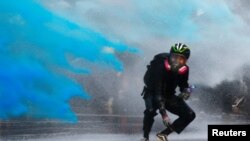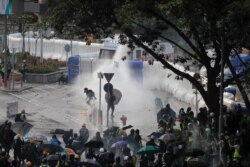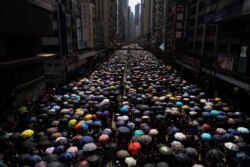Anti-government protesters clashed with police in Hong Kong again on Sunday, with demonstrators hurling rocks and Molotov cocktails at authorities who responded with volleys of tear gas and blasts of blue-dyed water fired from water cannons.
Some of the thousands of protesters threw bricks at police outside the Chinese People's Liberation Army base and tore down and set fire to a banner proclaiming the 70th anniversary of the October 1 founding of the People's Republic of China.
Police said in a statement, "Radical protesters are currently occupying Harcourt Road in Admiralty, vandalizing Central Government Offices and repeatedly throwing petrol bombs inside."
Some of the protesters engaged in cat-and-mouse skirmishes with police, setting street fires and blocking roads in the heart of the city. Authorities quickly doused the fires and fired tear gas to disperse the protesters. The bursts of blue-dyed water from the water cannons were used so authorities could later identify law-breakers.
It was the 99th day of the summer-long protests aimed at promoting democracy in the Chinese territory. The demonstrations originally started as protests against a bill that would have allowed the extradition of criminal suspects to mainland China to stand trial.
That measure has now been withdrawn, but the protests have continued in opposition to what demonstrators see as Beijing's interference in the oversight of Hong Kong despite promises of autonomy as spelled out when Britain returned Hong Kong to Chinese control in 1997. The protesters want universal suffrage and investigations into what they see as police misconduct in controlling the demonstrations.
Earlier Sunday, protesters gathered peacefully outside the British consulate, carrying signs that read, "Sino-British Joint Declaration is VOID," and "One country, two systems is dead." The demonstrators sang, "God Save the Queen."
More than 1,300 people have been arrested since the demonstrations began in early June.
The increasingly violent demonstrations have damaged Hong Kong's economy, which had already been weakened by the reciprocal tariff increases imposed by U.S. President Donald Trump and his Chinese counterpart, Xi Jinping, as the world's two largest economies try to negotiate a new trade agreement. More talks are set for next month in Washington.







